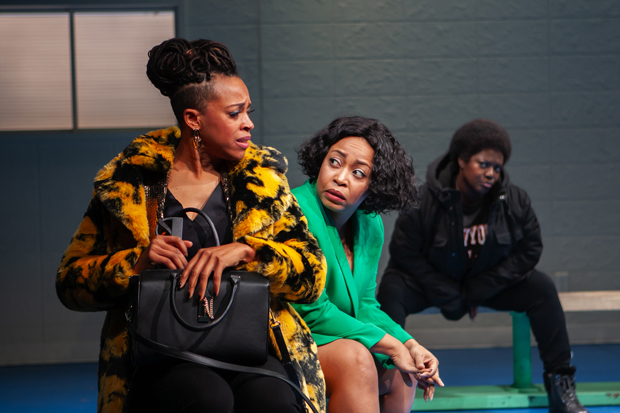Lynn Nottage's Busy Winter: Fabulation, Sweat, and The Secret Life of Bees
The two-time Pulitzer Prize-winning playwright looks ahead to her first major New York revivals and her musical debut.
Lynn Nottage is busy, as you'd expect a two-time Pulitzer Prize-winning playwright to be. But the winter of 2018 and 2019 is an almost mind-bogglingly prolific time for Nottage, with two major New York revivals (her first ever), a high-profile London premiere, and two musicals in the works.
First up — and currently running — is Signature Theatre's revival of Nottage's 2004 comedy Fabulation, or The Re-education of Undine, kicking off Nottage's three-play residency at the acclaimed off-Broadway theater. At the same time, but across the world, Nottage's Pulitzer Prize-winning Sweat is making its UK debut in a new production at the Donmar Warehouse.
In late January, Nottage's second play in her Signature season, a revival of her 2011 play By the Way, Meet Vera Stark, will take the stage, followed by her first musical, The Secret Life of Bees, in May 2019 at the Atlantic Theater Company. (Her second, a jukebox bio-musical about Michael Jackson, is still being written.)
Here, she looks ahead to each, while resisting the urge to change what she perceives as flaws in her earlier works.

(© David Gordon)
This conversation has been condensed and edited for clarity.
You've got so much going on right now. Let's start with your Signature season. Why did you select Fabulation and By the Way, Meet Vera Stark?
I was thinking of what would be fun to do and what would be fun to see, particularly now. They're plays that are very different from what people have come to expect from me as a writer. They're comedies, they're irreverent, they're broader, and I think they reflect a different side of myself.
These two plays are about black women who are grappling with identity in a culture that refuses to recognize them on their own terms. They're women who have to make these incredible compromised, dangerous choices in order to survive, or at least that's how they perceive it. In some ways, the plays are in conversation, and I thought that they might have resonance today.
Fabulation is not going to be everyone's cup of tea, and not everyone is going to understand the humor, but that's OK. One of the things that I've become super aware of, and forgive me for saying this, is that today, writers of color have been producing plays specifically for the white gaze. There's a whole litany of them that have been produced which are addressing that audience in particular, and I thought that these two plays are really, in some ways, meant to talk to a broader audience, and to black women, in particular.
As we speak, you've also got Sweat having its London premiere at the Donmar, and a modified version of the original production just finished a free tour across the Rust Belt.
The tour was kind of remarkable. We took it to 17 cities, and in many of the communities, there were folks who had never been to the theater before and who weren't conditioned to sit down and listen for two hours, but people leaned right into the play and were very engaged. It was extremely truthful and it resonated for them.
And then afterwards, we had these very robust conversations in which people stood up and didn't really ask questions, but testified and told their own stories. People were speaking from a very raw, honest, emotional place, which I think is beautiful. It was tremendous, I have to say.
I'm very excited to see it in London, and particularly now, with what's happening in regards to Brexit. I think it will have real resonance.

(© Monique Carboni)
And there are two musicals in your pipeline: The Secret Life of Bees, opening this spring at the Atlantic, and a show about Michael Jackson. How is the process of creating a musical different from that of writing a play?
Musicals require different muscles. Theater is collaborative, but musicals are collaborative in a much more intense way. From the very conception of the piece, you're in the room with several other people, wrestling with ideas and figuring out how to do it. For it to be successful, it really has to be the merging of everyone's sensibilities. Making sure that's effortless and unified is the task that at times can be difficult.
The Secret Life of Bees felt like a book that could very easily be translated to the stage. When I was approached, I looked at it and I made a list of where I thought the songs were. Then the lyricist, Susan Birkenhead, did the same, and so did Duncan Sheik, the composer. What was interesting was that we almost all saw exactly the same moments. I think that's why, ultimately, I said yes.
With Michael Jackson, I've never done a jukebox musical, I've never done a musical on this scale, and in all the things I've written, I've never done anything that's strictly biographical. The producers that we have right now are giving us a lot of creative leeway; so thus far, it's been a very pleasant and enjoyable process.







